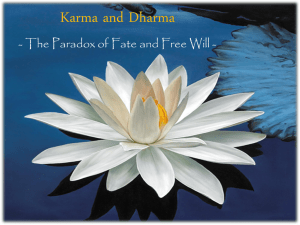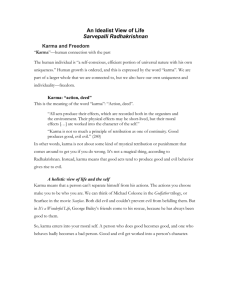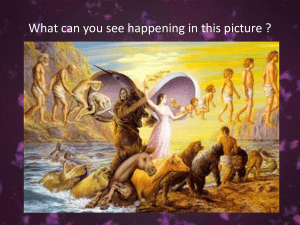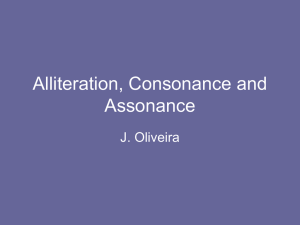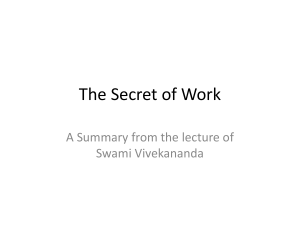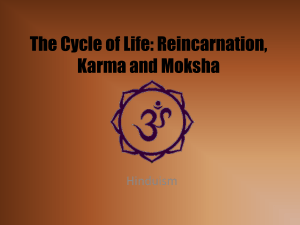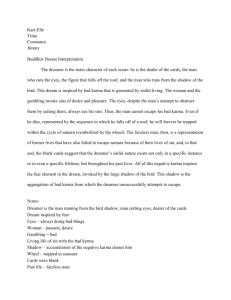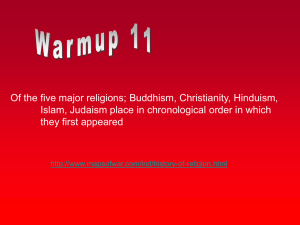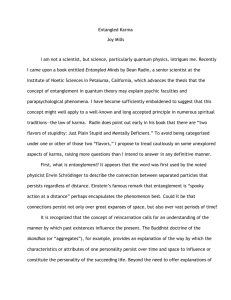Law of Karma
advertisement
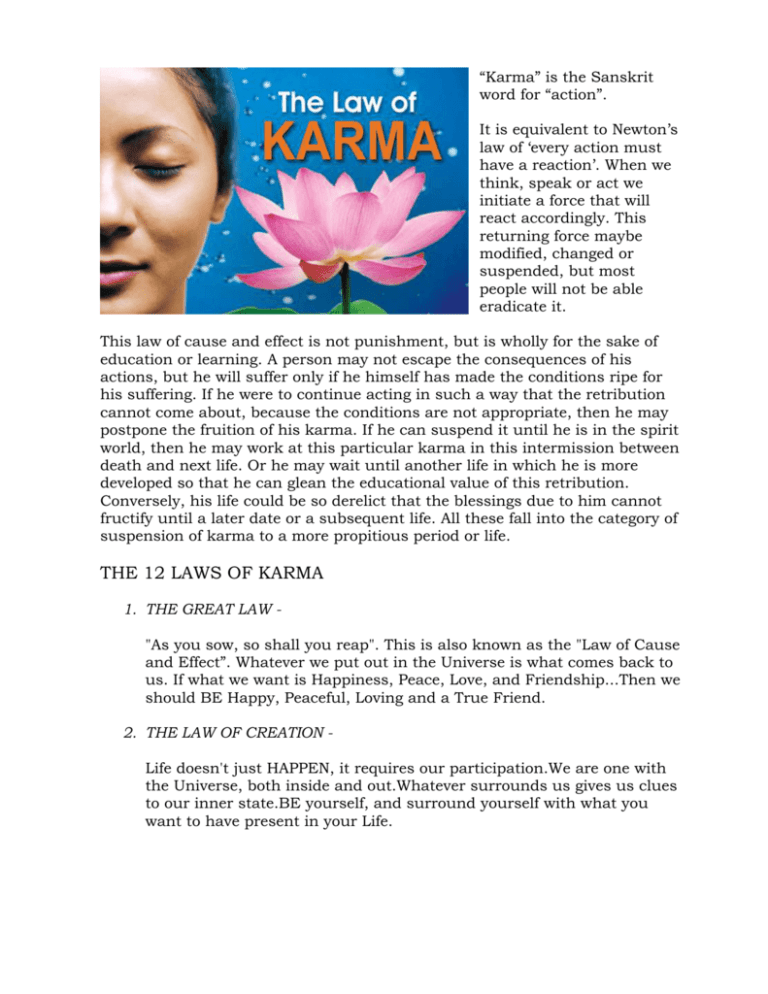
“Karma” is the Sanskrit word for “action”. It is equivalent to Newton’s law of ‘every action must have a reaction’. When we think, speak or act we initiate a force that will react accordingly. This returning force maybe modified, changed or suspended, but most people will not be able eradicate it. This law of cause and effect is not punishment, but is wholly for the sake of education or learning. A person may not escape the consequences of his actions, but he will suffer only if he himself has made the conditions ripe for his suffering. If he were to continue acting in such a way that the retribution cannot come about, because the conditions are not appropriate, then he may postpone the fruition of his karma. If he can suspend it until he is in the spirit world, then he may work at this particular karma in this intermission between death and next life. Or he may wait until another life in which he is more developed so that he can glean the educational value of this retribution. Conversely, his life could be so derelict that the blessings due to him cannot fructify until a later date or a subsequent life. All these fall into the category of suspension of karma to a more propitious period or life. THE 12 LAWS OF KARMA 1. THE GREAT LAW "As you sow, so shall you reap". This is also known as the "Law of Cause and Effect”. Whatever we put out in the Universe is what comes back to us. If what we want is Happiness, Peace, Love, and Friendship...Then we should BE Happy, Peaceful, Loving and a True Friend. 2. THE LAW OF CREATION Life doesn't just HAPPEN, it requires our participation.We are one with the Universe, both inside and out.Whatever surrounds us gives us clues to our inner state.BE yourself, and surround yourself with what you want to have present in your Life. 3. THE LAW OF HUMILITY What you refuse to accept will continue for you. If what we see is an enemy, or someone with a character trait that we find to be negative, then we ourselves is not focused on a higher level of existence. 4. THE LAW OF GROWTH "Wherever you go, there you are”. For us to GROW in Spirit, it is we who must change - and not the people, places or things around us. The only given we have in our lives is OURSELVES and that is the only factor we have control over. When we change who and what we are within our heart our life follows suit and changes too. 5. THE LAW OF RESPONSIBILITY Whenever there is something wrong in my life, there is something wrong in me. We mirror what surrounds us - and what surrounds us mirrors us; this is a Universal Truth. We must take responsibility what is in our life. 6. THE LAW OF CONNECTION Even if something we do seems inconsequential, it is very important that it gets done as everything in the Universe is connected. Each step leads to the next step, and so forth and so on. Someone must do the initial work to get a job done. Neither the first step nor the last are of greater significance, as they were both needed to accomplish the task. Past Present - Future they are all connected... 7. THE LAW OF FOCUS – You can not think of two things at the same time. When our focus is on Spiritual Values, it is impossible for us to have lower thoughts such as greed or anger. 8. THE LAW OF GIVING AND HOSPITALITY If you believe something to be true, then sometime in your life you will be called upon to demonstrate that particular truth. Here is where we put what we CLAIM that we have learned, into actual PRACTICE. 9. THE LAW OF HERE AND NOW Looking backward to examine what was, prevents us from being totally in the HERE AND NOW. Old thoughts, old patterns of behavior, old dreams...Prevent us from having new ones. 10. THE LAW OF CHANGE History repeats itself until we learn the lessons that we need to change our path. 11. THE LAW OF PATIENCE AND REWARD – All Rewards require initial toil. Rewards of lasting value require patient and persistent toil. True joy follows doing what we're suppose to be doing, and waiting for the reward to come in on its own time. 12. THE LAW OF SIGNIFICANCE AND INSPIRATION You get back from something whatever YOU have put into it. The true value of something is a direct result of the energy and intent that is put into it. Every personal contribution is also a contribution to the Whole. Lack luster contributions have no impact on the Whole, nor do they work to diminish it. Loving contributions bring life to, and inspire, the whole. There are 4 different types of karma that you are always working on: · Sanchita Karma: the accumulated result of all your actions from all your past lifetimes. This is your total cosmic debt. Every moment of every day either you are adding to it or you are reducing this cosmic debt. Prarabdha Karma: the portion of your "sanchita" karma being worked on in the present life. If you work down your agreed upon debt in this lifetime, then more past debts surface to be worked on. Agami Karma: the portion of actions in the present life that add to your "sanchita" karma. If you fail to work off your debt, then more debts are added to "sanchita" karma and are sent to future lives. Kriyamana Karma: daily, instant karma created in this life that is worked off immediately. These are debts that are created and worked off - ie. you do wrong, you get caught and you spend time in jail Dhyayato visayan pumsah sangas tesupajayate Sangat sanjayate kamah kamat krodho bhijayate While concentrating on objects of the senses a person develops attachment to the sense objects: from attachment desires are boen, from desire anger arises. Krodhad bhavati sammohah sammohat smrti-vibhramah Smrti-bhramsad buddhi-naso buddhi-nasat pranasyati From anger delusion occurs, from delusion bewilderment of memory, after forgetfulness of memory the loss of spiritual intelligence and losing spiritual intelligence one perishes. These two verses capture the basic message of the law of karma; being caught in the web of births and deaths is what Krishna describes as "he perishes". It is generally the story of most humans that the pot of sanchita karma keeps growing with each life. As more karma is added to the pot, it necessitates additional births to experience the fruits of action. This is because of man's ignorance that happiness is derived by sense objects, which he goes after every waking moment of his life. The loss of discrimination is what leads man to wrongly identify happiness as coming from sense objects. What is the strategy for relief from the cycle of births and deaths? What is the exit strategy? Theoretically speaking, the answer seems to be simple enough do not add more agami karma to the karma in storage and /or neutralize the sanchita karma once and for all. Here, an analogy can be made to an imaginary ring highway around a metropolitan area; this highway has no marked exits. A vehicle, with a perpetual source of energy, keeps going round and round with out any definite purpose. Such a vehicle, if it needs to get out, has to make a determined plan for and execute an exit strategy. The Rishis of sanatana dharma have determined such an exit strategy for a man to escape from the cycle of the law of karma. This strategy is a four step preparatory process called "sadhana chatushtaya" a four step spiritual discipline. The four steps are: 1. Viveka Discrimination of real from unreal 2. Vairagya Detachment or dispassion from sense objects 3. Shamadi shat sampatti A collective group of six behavior traits 4. Mumukshtva Intense desire to achieve permanent bliss "Only the actions of the just smell sweet and blossom in the dust." James Shirley

